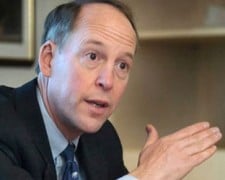
Rep. Greg Walden (R-OR), Chair of the House Communications Subcommittee, has penned an article suggesting to the FCC how it can maximize the benefits on an incentive auction in the television space, along the lines proposed by the Expanding Opportunities for Broadcasters Coalition.
Walden notes that the auction will be a failure if it doesn’t first attract television operators willing to sell off their spectrum, and suggests that an artificial cap on what they can earn might be kill off the program before it even gets started.
He also argued that there should be no restrictions put on who may bid for the spectrum, nor should any spectrum that could be auctioned be left for unlicensed use.
Here are the three points, as spelled out by Walden.
“First, the Commission must not artificially limit the potential compensation to broadcasters. This is, after all, an incentive auction, and it would be foolhardy to limit the incentives from the get-go. The market forces of the auction will apply competitive pressures on the compensation broadcasters require and determine the prices wireless carriers are willing to pay while still maximizing broadcaster participation.
“Second, the Commission must not exclude potential wireless bidders. Closing the auction to certain carriers would reduce competitive pressures and likely suppress the final bid amount, leaving crucial revenue on the table.
“Third, the FCC must auction all the airwaves it clears rather than giving some away for unlicensed use. Freeing the spectrum will come with appropriate but considerable cost, and the FCC needs not only to cover that cost but earn a healthy return if it is going to meet the legislation’s objectives. Although some blocks of spectrum will be worth more than others, bids will be proportional to the value. So while spectrum allocated to guard bands, for example, may be less useful, bidders will end up paying a price commensurate with the potential use. Every dollar’s worth of spectrum the FCC fails to monetize raises the risk that the FCC won’t cover its costs and garner enough money for the public safety network or deficit reduction. This is not the place for the Commission to try to push its unlicensed agenda. Plenty of other spectrum is already available for unlicensed use and other provisions of the spectrum law identify even more without cannibalizing the spectrum from the incentive auction.”
Walden concluded, “We have an unprecedented opportunity before us to help meet Americans’ growing thirst for mobile Internet service, advance the public safety network, and even raise needed federal revenue. Let’s not squander it.”





